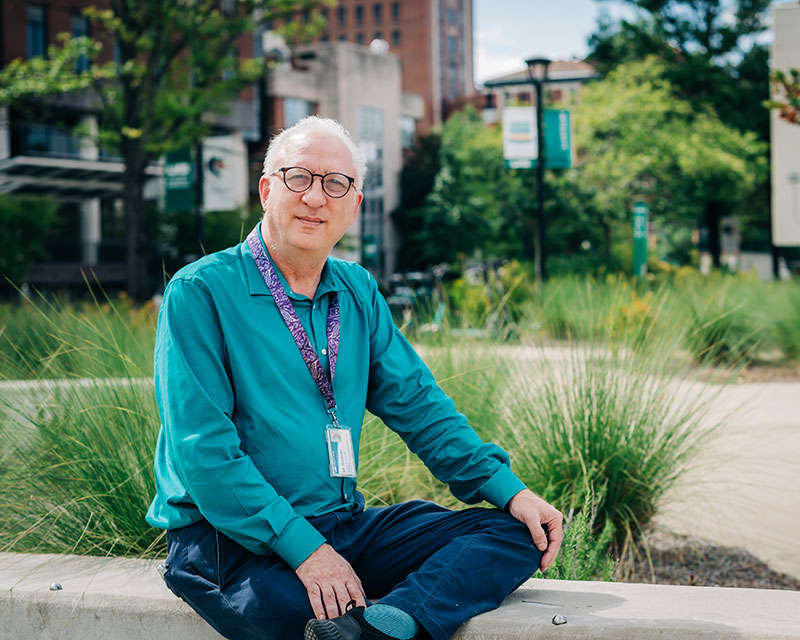An endowed professorship has been established to honor Andrew Duxbury, M.D., a leading geriatrics physician in The University of Alabama at Birmingham (UAB) Marnix E. Heersink School of Medicine, thanks to a generous gift made by a family member.

The Dr. Andrew Duxbury, M.D., Endowed Professorship will be focused on advancing the field of gerontology and geriatrics through clinical care, research, education, and community outreach. Its holders will work closely with Duxbury to train future clinicians in community-based geriatrics, taking a comprehensive team approach to care for individuals 65 and older who are frail enough to reside in a nursing home but still live independently.
“At this stage of my career, it didn’t make a lot of sense for whatever was created to benefit me because I’m bumping up on retirement age myself,” Duxbury said of the geriatrics support fund, established in 2022, that was converted to create his namesake professorship. “But it might make more sense if I come up with a way to complete it. Perhaps it could become in my honor and help continue my legacy and make sure the kinds of ideas I have brought to this institution and have tried to embody over the last three decades won’t leave when I do.”
Where most professorships are reserved for research, the Duxbury Endowed Professorship will focus on clinical care, education, and research, making a unique tribute to an outstanding clinician and educator, according to Kenneth Boockvar, M.D., Director of the Division of Gerontology, Geriatrics, and Palliative Care and Director of the Integrative Center for Aging Research at UAB.
“He is one of our most well-loved and sought after geriatrics doctors at UAB,” Boockvar said. “He is a master of clinical care for older patients and people in our community – the most complex patients with very serious concerns. He serves as a role model for many trainees at UAB and has been a leader in our division and his geriatrics practice for some time. And he has led care management initiatives, including a new program for people in our community with dementia and their caregivers.”
Duxbury’s dedication to caring for a vulnerable population inspired his cousin, John Hellmann – they share a maternal grandfather, who was also involved in academic philanthropy as founding chancellor of the University of California San Francisco – and his wife Betsy to pledge the funds needed to realize Duxbury’s wishes and move forward with the professorship.
“As the son of two professors in the sciences – a marine biologist mother and an oceanographer father – as well as the grandson of two Scottish-educated medical doctors, Dr. Duxbury’s tremendous contributions to the compassionate medical care of the elderly comes as no surprise to his extended family who always recognized his inquisitive, creative, and sharp scientific intellect from an early age,” Hellmann said.
Duxbury is eager to fill the professorship but recognizes the challenges facing a profession dedicated to confronting age and mortality, especially given the need for expanded geriatric services as the Baby Boomer generation continues to age. Geriatrics rarely garners significant philanthropic dollars, because most people are interested in supporting innovative research or targeting a specific disease, and most students and leading physicians interested in the field are concentrated near larger cities.
Of the roughly 400 licensed slots for geriatric fellows nationwide, only 150 were filled last year, Duxbury said. And with a rapidly aging population, that leaves the U.S. about 30,000 geriatricians short.
“I developed a philosophy on what I thought a good physician was and who they should be and how they should relate to patients,” Duxbury said, recalling how he became interested in geriatric medicine. “I came to the conclusion that to be a good doctor you had to know your patients. You had to be more interested in people than in pieces of people. You had to understand how your patients lived and what their lives were. You had to work with people who were not doctors and understand working together on teams was necessary. You had to admit you would not always have all the answers. I put all that together and the only place I could find in adult medicine that would allow me to do that was geriatric medicine.”
Duxbury hopes to attract a candidate who shares a similar philosophy and can continue the good work he’s done at UAB over the past 30 years, without the worry of generating clinical dollars.
A Seattle native, Duxbury came to UAB in the late 1990s with his first husband, only intending to stay in Birmingham for a few years. After a little more than a year in Alabama, his husband fell ill and passed away two years later.
Sensing it might lose Duxbury to another school, UAB presented him with a philanthropic grant to rebuild its ambulatory geriatrics clinic from the ground up, according to his design. During that years-long project he met his second husband, who encouraged him to turn to his love of musical theater to rebalance his life and help with his grief. Thus began a 15-year relationship with his second husband as well as with musical theater in Birmingham, juggling fulfilling careers as a performer and a physician.
When his second husband died suddenly in 2018, Duxbury was again at a crossroads, so he began to write about various topics, posting to blogs and social media. After the pandemic hit the following year, he turned his writing focus to COVID-19.
“I was so overwhelmed,” Duxbury said. “Somebody in my position, who is responsible for a very frail population in grave danger, I decided to really write about COVID – what it was, what it was doing to society, how all the different things were happening, and why they were happening. More and more people were reading it and saying, ‘I understand what is going on.’”
A friend agreed to publish his writing, and over the course of three years Duxbury wrote three volumes of The Accidental Plague Diaries, covering March 2020 through September 2022.
“I figured if nobody reads it, it will be a great primary source document for someone in 100 years,” he said.
Duxbury, who is nearing retirement age, continues to write and joins his local theater friends in a once-a-year investment in a Broadway musical. Last year they invested in Stereophonic, which won the Tony Award for Best New Play.
He said he’ll stay at UAB to help find the right person to fill the endowed professorship and ensure his legacy of perseverance and compassion – formed both personally and professionally – survives long after he’s left.
“That should give me long enough, with the endowment now in place, to be able to help find the right person so that those things that I have built, including the clinic, don’t vanish when I do.”


